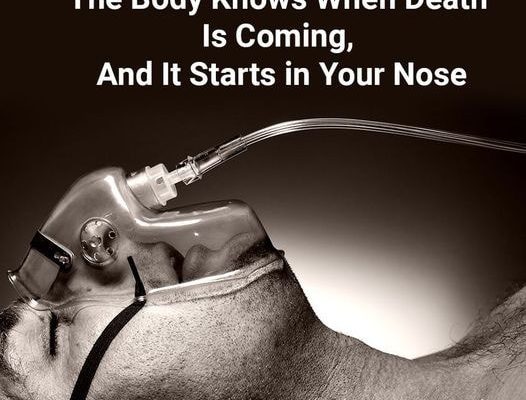Death has always been a topic of curiosity and mystery, with countless theories and beliefs surrounding the end of life. Intriguingly, scientific research suggests that our sense of smell might offer clues about when death is near. Whether it’s the ability to detect death in others or the loss of smell serving as a predictor of one’s own health, the human nose may hold the key to understanding life’s final chapter.

Smelling Death: A Sixth Sense?
For years, anecdotal accounts have described people sensing a peculiar smell before the death of a loved one. This phenomenon has led some to believe in a “sixth sense” tied to our olfactory system. While the idea may sound otherworldly, there are plausible scientific explanations for this occurrence.
One theory suggests that as the body approaches death, it releases specific chemicals or odors. These scents may go unnoticed by most people, but individuals with heightened olfactory sensitivity might detect them. Another possibility is that subtle emotional changes, triggered by our sense of smell, help us intuitively sense impending loss. Though not consciously recognizing the scent, we may feel its impact on a deeper, subconscious level.
Studies have also explored the role of animals in detecting death. Research conducted by the University of Chicago indicates that animals, such as dogs and cats, can sense chemical changes in humans caused by illnesses like cancer. In some cases, animals in hospitals or long-term care facilities have demonstrated an uncanny ability to predict when a patient is near death. If animals can do this, might humans possess a similar, albeit less refined, ability?
Loss of Smell: A Window Into Your Health
While some may detect the approach of death in others, losing one’s own sense of smell can serve as a warning sign for future health problems. Numerous studies have linked declining olfactory function to conditions such as Parkinson’s, Alzheimer’s, and cardiovascular diseases. The deterioration of the olfactory system often occurs before other symptoms emerge, making it a potential early indicator of serious health concerns.
A study published in the Journal of the American Geriatrics Society found that older adults with a diminished sense of smell were significantly more likely to die within five years compared to those with healthy olfactory function. This finding underscores the importance of monitoring changes in smell as part of overall health assessments. Early detection of olfactory decline could lead to timely interventions and improved outcomes.
The Future of Smell-Based Predictions
As science continues to unravel the complexities of the human body, the olfactory system is gaining recognition as a critical player in predicting health and mortality. Researchers are investigating the chemical changes in the body that occur before death, as well as the broader implications of olfactory dysfunction. With advancements in this field, we may one day develop diagnostic tools that utilize the power of smell to identify health risks and prevent severe outcomes.
Such tools could revolutionize healthcare by offering non-invasive, cost-effective methods to detect diseases early. The potential applications extend beyond individual health, influencing how we understand the interconnectedness of human senses and physiological systems.
The Nose Knows: A Fascinating Frontier
The idea that “the body knows when death is near, and it begins in your nose” sheds light on the fascinating role of the olfactory system in life and death. Whether it’s sensing the approach of death in others or recognizing the loss of smell as a predictor of declining health, our nose holds untapped potential in the realms of medicine and biology. By exploring this lesser-known sense, we stand to gain invaluable insights into human well-being, enhancing both the quality and longevity of life.



